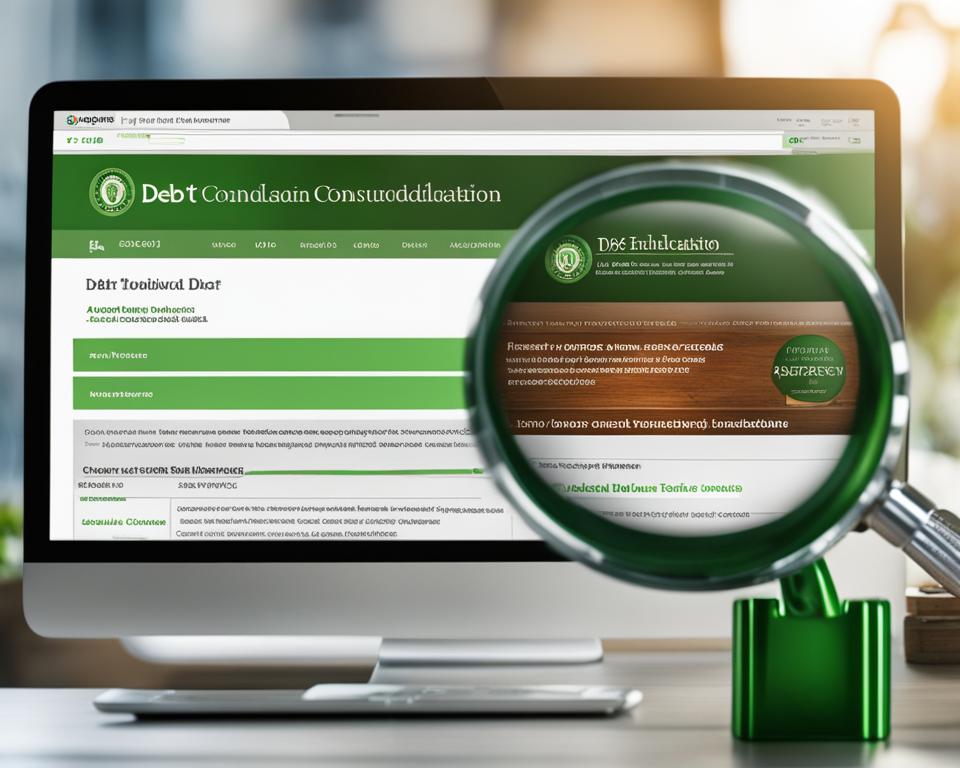The road to financial freedom is often fraught with obstacles, and for those burdened by multiple debts, debt consolidation emerges as a beacon of hope. However, this path is not without its pitfalls—chief among them, the debt consolidation scams that cast a long shadow over well-intentioned financial solutions. These fraudulent schemes cleverly target individuals seeking to lighten their fiscal loads, promising ease and clarity but delivering complications and chaos. Avoiding such debt relief fraud is not just advisable, it’s imperative for maintaining personal financial security and peace of mind.
To traverse the terrain of debt relief without falling victim to deception, consumers must exercise vigilance and informed skepticism. Knowledge of common scam tactics and a thorough understanding of legitimate debt consolidation processes are indispensable tools in one’s financial arsenal. It’s in the act of avoiding debt consolidation scams that one can truly step towards regaining control over their economic well-being.
Key Takeaways
- Debt consolidation should simplify finances, not complicate them with scams.
- Research and knowledge are vital in identifying and avoiding fraudulent schemes.
- Fraudulent schemes often use the guise of debt relief to exploit financial distress.
- Vigilance is key when seeking debt consolidation services to avoid scams.
- Legitimate debt relief options exist and can offer a path to financial stability when carefully chosen.
- Understanding legitimate practices helps in steering clear of debt relief fraud.
Understanding the Basics of Debt Consolidation
Debt consolidation is regarded as a beacon for those looking to regain control over their financial lives. It is a strategy that combines multiple debts into one single payment, often with the goal of securing lower interest rates and achieving long-term debt relief. Navigating through the various consolidation options requires a clear understanding of what each entails and how it can impact one’s financial journey.
The Role of Debt Consolidation Loans
One widely adopted approach is debt consolidation loans. These loans allow individuals to pay off their existing debts and, in turn, focus on repaying a single loan with more favorable terms. Often, these loans come with a fixed interest rate, providing a steady repayment schedule and potentially lower total interest over the loan’s life span. When considering a debt consolidation loan, it is crucial to assess interest rates, repayment periods, and any associated fees to ensure it aligns with one’s debt relief objectives.
Transferring Balances to a Single Credit Card
Another popular tactic involves using a balance transfer credit card. This type of card typically offers a low introductory APR, making it an attractive option for transferring balances from high-interest credit cards. The goal here is to capitalize on the promotional period to pay down debt more efficiently. Prior to obtaining a balance transfer card, it is recommended to verify the duration of the low-interest rate and to be cognizant of balance transfer fees or any rate hikes post-promotional period.
The Ins and Outs of Debt Management Plans
Debt management plans are structured assistance programs provided by credit counseling agencies. These plans consolidate a debtor’s obligations into a cohesive payment plan, sometimes at reduced interest rates. Agencies work on the debtor’s behalf with creditors to manage and negotiate terms. Essential to note is that these plans require consistent, timely payments, and detailed scrutiny of the agency’s reputation and fees is advised to avoid any adverse surprises.
The Risks of Debt Settlement on Your Credit
Debt settlement is often seen as a more drastic approach to debt consolidation. This process involves negotiating with creditors to settle a debt for less than what is owed. While it can lead to significant debt reductions, it can also pose considerable risks to one’s credit score. Settlements typically involve falling behind on payments to leverage negotiations, which can reflect negatively on credit reports. Weighing the potential credit impact against the debt relief is critical for anyone considering this option.
In conclusion, while debt consolidation presents several paths to simplifying financial obligations, it is of the utmost importance for individuals to approach each option with due diligence. Understanding the specific terms, risks, and benefits of debt consolidation loans, balance transfer credit cards, debt management plans, and debt settlement can empower consumers towards making informed decisions tailored to their unique financial situations.
Recognizing the Red Flags of Debt Consolidation Scams
When considering debt consolidation, the ability to spot potential scams is paramount. Awareness of the common pitfalls and red flags associated with these fraudulent practices can significantly aid individuals in identifying debt relief scams, mitigating the risk of becoming a victim. Let’s delve into the prominent alarm signals that indicate the presence of deception in the field of debt consolidation.
- Upfront Payments: A classic indication of a scam is the demand for pre-service fees, commonly camouflaged as “administrative” or “setup fees”. Genuine debt relief services do not require payment before rendering assistance.
- Aggressive Sales Pitch: High-pressure tactics that push for impulsive decisions are a definite debt consolidation red flag. Legitimate companies provide the time and information needed for informed decision-making.
- Unsolicited Offers: Be wary of unexpected offers that find you, often preying on financial vulnerability. Authentic services are typically sought out by the consumer, not the other way around.
- Instructions to Avoid Creditors: Any advice that suggests stopping communication with creditors or not paying bills should trigger caution and skepticism.
| Warning Sign | Why It’s a Red Flag | Action to Take |
|---|---|---|
| Demand for Upfront Payment | Legitimate debt consolidation services are performance-based. | Refuse payment; seek assistance elsewhere. |
| Pressure for Immediate Signature | May lead to agreeing to unfavorable terms without proper review. | Take your time; do not be rushed. |
| Nonexistent Government Programs | Promises access to special programs that don’t exist. | Conduct thorough research on valid programs. |
| Stopping Bill Payments | Can result in debts accruing additional fees and penalties. | Continue payments until a viable plan is established. |
Guarantees of immediate debt forgiveness or access to special government programs are also signs of probable fraud in the domain of debt consolidation. When any provider claims to have a one-stop solution for all debt-related woes, giving the illusion of easy fixes, it invariably hints at debt consolidation pitfalls that can have long-lasting repercussions on one’s financial health.
In summary, a blend of skepticism and due diligence serves as your best defense against deceptive endeavors. Checking the credentials of the consolidation service, including the company’s track record and customer reviews, are essential steps to confirming legitimacy. By understanding and recognizing these red flags, you are much better positioned to make prudent financial decisions, steering clear of malicious schemes that put your fiscal stability at risk.
Debt consolidation scams: How to Identify Warning Signs
When searching for ways for avoiding debt consolidation scams, it is essential to be aware of tactics used by malevolent actors in the financial industry. These can range from upfront payment scams to baiting consumers with unsolicited debt relief offers. Becoming educated on these schemes is a crucial step towards securing your financial well-being and ensuring you’re not misled by fraudulent organizations.
Upfront Payment Demands as a Signal
Scammers frequently ask for large upfront payments, disguising them as necessary fees for debt relief services. Legitimate companies, however, will typically not require payment before rendering any services. Any request for an initial payment should be regarded as a warning sign that the company may not have your best interests at heart.
High-Pressure Sales Tactics and the Urgency Trap
Another common characteristic of a scam is the use of high-pressure sales tactics that push you to make a quick decision. If you’re being rushed or feel pressured without having ample time to think through the proposal, it is likely a tactic to get you to commit to something that is not beneficial for you in the long run.
Unsolicited Offers – Proceed with Caution
Receiving an unsolicited offer for debt consolidation can be flattering, but it can also be a trap. Be especially wary of unsolicited debt relief offers that promise to wipe your debts or provide unrealistically favorable terms without you having initiated contact.
Dangers of Cutting Off Communication with Creditors
Advisors who suggest cutting communication with your creditors are a big red flag. This can damage your credit relationships and lead to increased interest rates, penalties, or even legal action against you.
The Pitfall of Halting Payments on Debts
Ceasing to make payments on your existing debts is one of the pitfalls of debt consolidation that can plunge you deeper into financial trouble. Scammers may suggest this as a strategy, but it can lead to negative marks on your credit report and increased financial liability.
Non-Disclosure of Terms and Services
Transparency is key when it comes to financial services. Failure to disclose full terms and hiding important details about services are indicators of deceitful practices. Ensure that all terms are clear and in writing before agreeing to any debt consolidation service.
Being informed is the best defense against falling victim to debt consolidation scams. By carefully scrutinizing offers and keeping an eye out for dubious signs, you can protect yourself and move towards a more stable financial future without fear of being exploited by scam artists.
Investigating the Tactics Scammers Use
When it comes to financial stability, tactics of debt consolidation scams can significantly derail consumers’ efforts towards achieving debt freedom. It’s crucial to shed light on certain debt relief fraud strategies that are often hidden beneath the promise of fast credit repair and financial relief. The first step in identifying fraudulent debt relief services starts with understanding these deceptive practices. Among the most prevalent schemes is the promise of debt negotiation or reduction, which frequently involves substantial upfront fees with no subsequent service provided.
- Robocalls: Despite being listed on the Do-Not-Call registry, consumers may still receive unsolicited calls offering debt relief services, a common sign of a scam.
- Upfront Fees: A major red flag is when companies charge for debt consolidation before rendering any services, contrary to legitimate practices which only require payment after services are completed.
- Bait of Quick Fixes: Offers that claim to quickly modify loans or cleanse credit reports prey on those desperate for a quick financial fix, often leaving individuals in deeper trouble.
Beyond these initial warning signs, scammers often use persuasive and aggressive language to create a sense of urgency, pushing consumers to act without considering the consequences. They might also make baseless claims about their abilities to quickly and easily erase debt, which is rarely the case. The table below compares common claims made by fraudulent services against what reputable companies offer, helping individuals discern between the two and avoid potential scams.
| Fraudulent Debt Relief Claims | Legitimate Debt Relief Services |
|---|---|
| Immediate debt elimination | Long-term debt management plans |
| Guaranteed debt reduction | No guaranteed outcomes, realistic expectations |
| No disclosure of associated fees | Clear explanation of fees and charges |
| Unverifiable success stories | Verifiable customer testimonials |
Ultimately, knowledge is power when combating these fraudulent entities. By closely investigating the tactics of debt consolidation scams, consumers can arm themselves with the tools necessary to avoid falling victim to debt relief fraud strategies. Awareness, coupled with skepticism, is key in this fight for financial security.
The False Promise of Exclusive Government Programs
Within the realm of debt relief, the promise of exclusive government programs can often mislead consumers into believing they are about to embark on a path towards financial salvation. Regrettably, claims of limited-access government aid and specialized endorsements are, more often than not, the hallmarks of debt consolidation scams. Real government debt relief programs are available to the public and do not require secret knowledge or exclusive access to utilize them.
Debunking Claims of Specialized Government Endorsements
The notion that certain companies have exclusive government endorsements to provide debt relief services is fundamentally flawed. Genuine government debt relief programs are typically well-documented and available for scrutiny by any member of the public. The Federal Trade Commission (FTC) is transparent about the reality of these services and cautions individuals against any company boasting preferential access to government programs.
How to Verify Legitimate Government Debt Relief
Verifying legitimate government debt relief options is a critical step for consumers looking to manage their debts responsibly. Thorough research, including consulting official government websites and trusted consumer protection resources, is key to separating fact from fiction. Consumers must remain vigilant and question the validity of any company that promises a shortcut to debt relief through non-existent or misrepresented government programs.
As consumers navigate the complex terrain of debt consolidation, they should remember that credible resources and programs will demonstrate full transparency and accuracy in their offerings. By understanding that exclusive government endorsements are often a warning sign, individuals can verify legitimate debt relief avenues and steer clear of the predators of the industry.
Navigating Online Resources to Verify Legitimacy
When researching debt consolidation companies, individuals should not only focus on the potential benefits but also make a concerted effort to assess the credibility and legitimacy of the organizations offering these services. To ensure consumers are not led astray, it is crucial to be meticulous in verifying debt relief legitimacy by leveraging a variety of online resources available at their fingertips.
One effective method to gauge a company’s reputation is by sifting through online reviews from past clients. These testimonials can offer real-life experiences and insights into the company’s operations, customer service, and success rate. Another reliable recourse is examining a company’s rating and any complaints on file with the Better Business Bureau (BBB). Furthermore, contacting the state attorney general’s office to check for any registered grievances against the debt consolidation firm can be instrumental in making a well-informed decision. Here is how a typical research process might look:
- Initial information gathering from the company’s website and promotional materials.
- Scouring consumer review platforms for user experiences and satisfaction levels.
- Verifying accreditation and ratings on the Better Business Bureau’s website.
- Checking for registered complaints or legal actions with the state attorney general.
- Consulting financial forums and consumer protection sites for additional feedback on the company’s practices.
An organized approach to vetting firms using these online resources for debt consolidation can provide not only assurance but also protect against potential fraud or ineffective debt relief services.

The table below encapsulates key data points that individuals can reference while researching the legitimacy of debt consolidation companies:
| Resource | What to Look For | Expected Outcome |
|---|---|---|
| Consumer Reviews | User experiences, satisfaction ratings, recurring issues | Understanding of company’s track record |
| Better Business Bureau (BBB) | Accreditation status, rating, complaint history | Insight into company reliability and consumer disputes |
| State Attorney General | Complaints, legal actions taken against the company | Assessment of legal legitimacy and potential red flags |
| Financial Forums | Peer-to-peer advice, niche expert opinions | Additional perspective and confirmation of findings |
| Consumer Protection Sites | Alerts on scams, educational content on debt consolidation | Resources to avoid scams and make informed decisions |
The diligence in employing these measures is essential in discerning credible companies from false ones exploiting the vulnerable. Incorporating these steps into one’s research strategy can significantly aid in researching debt consolidation companies and ultimately establish a secure path to achieving financial stability.
Understanding the FTC’s Regulations on Debt Relief Services
The Federal Trade Commission’s tight oversight on debt relief services establishes a safeguard for consumers navigating financial uncertainty. With strict policies to counteract deceptive practices, the FTC’s debt relief service regulations play a crucial role in maintaining transparency and fairness within the industry. Their uncompromising stance on advance fee prohibitions, enforcement against misrepresentation, and insistence on mandatory disclosures are instrumental in protecting financially distressed consumers from fraudulent debt relief offerings.
Prohibitions on Advance Fees by the FTC
In an aggressive move to prevent the exploitation of consumers, the FTC’s regulations restrict debt relief services from charging advance fees. These advance fee prohibitions ensure that consumers do not pay until a legitimate and measurable benefit is received, such as the successful reduction or settlement of debt. This preemptive measure is designed to prevent situations where services promise results but fail to deliver after fees are collected.
Misrepresentation in Debt Relief Advertising
The FTC’s regulations also address misrepresentation in debt consolidation and relief advertising. It’s crucial for consumers to receive accurate and straightforward information about the potential outcomes and implications of enlisting debt relief services. The FTC actively monitors and penalizes false advertising, thus curbing exaggerated success rates and fabricated testimonials that can mislead consumers into unwise financial decisions.
Mandatory Disclosures for Debt Relief Providers
To further empower consumers, strict guidelines for mandatory disclosures are in place, obliging debt relief providers to share key details about their services. These disclosures encompass clear explanations of associated costs, program durations, and the potential negative consequences for consumers’ credit scores. Through these measures, the FTC reinforces the importance of an informed decision-making process, ensuring consumers understand the full scope of agreements they are entering.
Adherence to the FTC’s frameworks concerning debt relief advertising restrictions is also enforced rigorously. By closely regulating how debt relief services present themselves to the public, the FTC aims to suppress false hopes and ground expectations in reality, therefore averting scenarios in which vulnerable individuals might be swindled by unattainable promises of debt amnesty.
How to Steer Clear of Upfront Fee Schemes
When it comes to avoiding upfront fee scams, it’s essential for consumers to be fully informed about the law and its safeguards against fraudulent fees. The Telemarketing Sales Rule is a vital piece of legislation that prohibits debt relief companies from charging fees before they achieve a successful debt reduction or settlement for the customer. This knowledge is critical in steering clear of fraudulent fees and avoiding common debt consolidation pitfalls.
Here’s a quick, straightforward guide to help ensure you’re working only with legitimate debt consolidation firms:
- Always ask about fees. Legit companies won’t evade the question.
- Never pay upfront. The Telemarketing Sales Rule makes it clear: no results, no fees.
- Do your research. Look into the company’s track record with entities like the Better Business Bureau.
- Keep your antenna up for promises that sound too good to be true. They often are.
Moreover, as you navigate the process of consolidating your debts, it’s imperative to maintain a checklist to prevent falling into the clutches of scam artists:
| Checklist Item | Why It Matters |
|---|---|
| Written Agreement | Avoid misunderstandings and ensure all promises are documented. |
| Success Rate Transparency | Reputable services can provide success stories or statistics. |
| No Hidden Fees | Unexpected costs can signal a problematic service provider. |
| Time Frame for Results | Trusted companies can give you a realistic timeline for debt relief. |
Remember, your financial well-being is too important to jeopardize with hasty decisions or by falling prey to deceitful upfront fee demands.
Ultimately, the best course of action is one of proactive vigilance. By being cautious and staying informed about the Telemarketing Sales Rule and practicing comprehensive research, you’re armoring yourself against the multitude of scams waiting to take advantage of your financial situation. It’s your money, your credit, and your future on the line—shield them with knowledge and assertive decision-making.
Why Comparing Debt Consolidation Offers Protects You
When it comes to easing the burden of debt, comparing debt consolidation offers is a crucial step to avoid financial pitfalls. It isn’t just about finding a lower monthly payment; it’s about ensuring that the path chosen is sustainable and cost-effective in the long run. Careful analysis of debt consolidation loans, balance transfer credit cards, and debt management plans can reveal significant differences that greatly impact one’s financial health.
Analyzing the Terms of Different Debt Consolidation Loans
Analyzing debt consolidation loans involves reviewing interest rates, repayment terms, and any potential fees. It’s essential for consumers to scrutinize the fine print and compare the long-term costs of the loans rather than just the immediate reduction in monthly payments.
Balance Transfer Credit Cards Comparisons
Comparisons between balance transfer credit cards can unveil opportunities to reduce interest payments significantly. However, one must take into account balance transfer fees and ensure the promotional rate provides enough time to pay off the debt before standard rates apply.
Assessing Fees and Rates of Debt Management Plans
Assessing debt management plans requires consumers to look beyond the promised lower payment. It’s about understanding the fees charged by the credit counseling agency and the concessions that creditors are ready to make. Below is a table comparing two fictional debt management plans highlighting various factors to consider.

| Criteria | Plan A | Plan B |
|---|---|---|
| Monthly service fee | $25 | $35 |
| Interest rate reduction | 7% reduced to 5% | 7% reduced to 4% |
| Creditor participation | All creditors | Major creditors only |
| Duration of plan | 4 years | 5 years |
| Total debt repayment | $12,000 | $13,500 |
By assessing debt management plans carefully and analyzing these factors, debtors can choose the plan that will most effectively help them to reduce their debt burden while also being manageable in terms of their regular financial obligations.
The Crucial Aspect of Transparency in Debt Relief
When people seek help from debt relief services, their primary goal is to gain clarity and control over their financial situation. Transparency in debt consolidation plays an integral role in achieving this peace of mind. It fosters trust between the service provider and the consumer, and it is the hallmark of honest debt relief services. A transparent company will have no reluctance to explain the complexities of the debt relief process, ensuring clients are equipped with a comprehensive understanding of debt relief terms.
An underlying principle of any reputable debt relief service is that all information should be disclosed upfront, during, and after the course of the debt consolidation process. This includes a full disclosure of the program’s costs, the timeline, expected outcomes, and any potential negative consequences that may affect the consumer’s credit score or financial well-being.
For clarity, let’s break down the critical aspects of transparency within a debt consolidation service:
- **Full Fee Structure**: Understanding the exact charges involved and when they are due is vital for budgeting and avoids unpleasant surprises.
- **Timeline**: A clear outline of how long the consolidation process is expected to take can help consumers plan for their financial future.
- **Result Expectations**: Honest predictions about the potential outcomes—both positive and negative—equip individuals to make informed decisions.
- **Terms and Conditions**: Comprehension of the agreement details ensures that individuals are not legally vulnerable to terms that could be damaging.
In addition, consumers have the right to access their contractual information at any time, partnering with debt relief agencies that keep them in the loop regarding any adjustments or developments within their consolidation plan.
| Debt Relief Service Aspect | Description | Impact on Consumer |
|---|---|---|
| Fee Disclosure | Full transparency regarding service fees and payment schedules. | Consumers can budget appropriately and avoid hidden cost shocks. |
| Process Timeline | Providing a clear timeline for each step of the debt consolidation. | Consumers can manage expectations and plan accordingly. |
| Outcome Projections | Honest dialogue about possible savings and impact on credit scores. | Consumers can evaluate if the service aligns with their financial goals. |
| Detailed Agreements | All agreements are written out with comprehensive terms explained. | Consumers have clarity about obligations and potential risks. |
Empowerment through education is a cornerstone of honest debt relief services. Those that prioritize educating their clients about the effects of consolidation and how it works will ultimately contribute to an authentic and productive path to financial stability. Navigating the tumultuous landscape of debt does not have to be a voyage amidst the fog when providers embrace transparency as their guiding light.
Actions to Take if You Encounter a Debt Consolidation Scam
When you suspect that you’ve come across a debt consolidation scam, there are several key steps you can immediately take to safeguard yourself and others. By reporting these incidents, not only can you help halt these deceptive practices, but also ensure that others are warned against such scams. Knowing the right authorities to contact and the process of reporting can make a significant difference in the fight against financial fraud.
Filing a Complaint with the Consumer Financial Protection Bureau
If you’ve fallen victim to a scam, the Consumer Financial Protection Bureau (CFPB) stands ready to assist. Filing a debt scam complaint with the CFPB is straightforward, and it helps the agency track and regulate unfair practices witnessed within the industry. The CFPB serves as a national resource for consumer protection and provides the necessary guidance on how to navigate the aftermath of encountering a fraudulent scheme.
Reporting to the Better Business Bureau
The Better Business Bureau (BBB) is another valuable ally when it comes to exposing fraudulent activities. By alerting the BBB about your experiences with a debt consolidation scam, you contribute vital information that can prevent future scams. The BBB maintains a public record of companies’ reputations, which is a crucial tool for consumers conducting their due diligence before engaging with any debt relief services.
Contacting Your State’s Attorney General
Reaching out to your state attorney general can also be an influential move. State attorney generals have the power to enforce local consumer protection laws and can take direct action against deceitful operations within their jurisdiction. Reporting debt consolidation scams to this office not only initiates an investigation but also increases the chances for broader legal action to be taken against the scammers.
Remember, by taking these steps, you’re not only seeking personal redress but also contributing to a safer financial environment for everyone. Organizations like the CFPB, BBB, and state attorney generals rely on consumer reports to bring light to these illegal practices and work diligently to keep the marketplace fair and transparent for all.
Special Focus: The Rise of Debt Relief Scams in Texas
As Texas grapples with an upsurge in debt relief scams, considerable emphasis has been placed on educating consumers on the dangers of these fraudulent activities. Highlighted by promises of debt cancellation or drastic reduction, these rising fraudulent debt relief tactics are a growing concern. Regrettably, the lure of a quick fix to daunting debts is often bait used by scammers to deceive Texas residents, leading unwary individuals into elaborately disguised traps.
To effectively tackle the issue of Texas debt consolidation fraud, it is critical to be aware of the hallmarks of deceit. One such trait is the requirement of up-front fees before any service is provided, which should immediately raise red flags for Texan consumers. Here, informed skepticism can serve as a powerful tool to differentiate legitimate debt relief firms from swindlers.
Consumers seeking aid in managing their financial troubles must remain discerning and question the too-good-to-be-true promises offered by some debt relief services in Texas.
Engaging in careful research and holding firm against the pressure to make hasty decisions can protect Texans from the pitfalls of debt relief scams. Practical steps include probing the credentials of the company offering the services, scrutinizing customer testimonials, and verifying whether the company has a history of complaints.

- Thoroughly investigate the background of the company.
- Avoid providers who charge fees before delivering results.
- Be wary of guarantees for quick debt elimination.
- Steer clear of demands to cease communication with creditors.
By employing vigilance and due diligence, Texans can steer clear of the fraudulent activities that are unfortunately on the rise in the sector of debt consolidation and relief. It is a collective duty for Texas communities to remain on alert, enabling the state’s residents to pursue valid debt relief options without succumbing to the manipulations of scam artists.
Ultimately, as Texas continues to fight back against these predatory practices, education and awareness prove to be the strongest deterrents in the preservation of financial stability and the pursuit of legitimate debt resolution.
Conclusion
In the intricate world of finance, the endeavor to alleviate debt can often be as complex as the debts themselves. It’s a landscape where debt consolidation scams lurk around every corner, preying on those who seek a fresh financial start. Vigilance and a commitment to research are the cornerstones of avoiding debt relief fraud. Consumers must exercise cautious inspection and a judicious mindset when navigating these waters, always seeking legitimate avenues that offer clarity and concrete assistance.
Armed with knowledge and an insistence on safe debt consolidation practices, individuals can protect themselves from malevolent schemes designed to ensnare and exploit. Scrutinizing the fine print, challenging too-good-to-be-true promises, and verifying the credibility of debt consolidation offers are not just recommended steps—they are essential to ensuring the chosen path leads to relief, not further financial distress. By remaining steadfast in these practices, consumers position themselves to make empowered decisions that honor their journey toward economic stability.
Ultimately, the route to conquering debt is a testament to the power of informed decision-making. It is important to remember that legitimate and ethical debt consolidation solutions exist and can serve as valuable tools for reclaiming control over personal finances. By maintaining a foundation of skepticism and seeking transparency in all transactions, individuals can effectively sidestep the pitfalls of scams and confidently progress toward their goal of financial freedom.
FAQ
What are common red flags indicating a debt consolidation scam?
Common red flags include demands for upfront payment, high-pressure sales tactics, unsolicited offers, suggestions to cease communication with creditors, guarantees of debt forgiveness, and proposals of exclusive government programs.
How can I tell if a debt relief service is legitimate?
To verify legitimacy, look for transparency in terms and fees, user reviews, company ratings on the Better Business Bureau, and check for any complaints filed with state attorney generals or the Federal Trade Commission (FTC).
What are the risks of debt settlement on my credit score?
Debt settlement can significantly harm your credit score as it may involve paying less than the full amount owed on your debts, which is generally reported to credit bureaus as a negative mark.
Are there legal protections against advance fee scams in debt consolidation?
Yes, the FTC’s Telemarketing Sales Rule prohibits debt relief companies from charging advance fees before they have successfully settled or changed the terms of at least one of the consumer’s debts.
How can upfront payment demands signal a potential scam?
If a company requests a large fee in advance without rendering services, it’s a potential scam. Legal debt relief services should only charge fees after delivering the promised assistance.
Can I trust unsolicited offers for debt relief services?
Unsolicited offers should be approached with caution, as they’re a common strategy used by scammers. Always conduct independent research to ensure the company’s legitimacy before engaging with their services.
What should I do if I encounter a debt consolidation scam?
Report the scam by filing a complaint with the Consumer Financial Protection Bureau, alerting the Better Business Bureau, or contacting your state’s attorney general to take further action against the fraudulent company.
Why is transparency important when dealing with debt relief services?
Transparency indicates that a company is open about its terms, fees, and practices. Companies that provide full disclosures and contracts in writing are more likely to be legitimate and trustworthy.
How does the FTC regulate debt relief and debt consolidation services?
The FTC enforces rules to protect consumers, such as prohibiting advance fees, cracking down on false advertising, and ensuring companies provide clear and detailed disclosure of terms.
What tactics do scammers use in debt consolidation scams?
Scammers tend to use a variety of tactics including promising quick fixes, employing robocalls, posing as government-endorsed programs, demanding upfront fees, and offering to perform illegal actions like changing your identity.
How are exclusive government program claims in debt relief scams debunked?
Claims of exclusive government programs are often fraudulent. Genuine government-affiliated debt relief programs are publicly available and do not require special access through a private company.
What steps can I take to avoid debt consolidation fraud in Texas?
Always be skeptical of guarantees of debt elimination, steer clear of upfront fee requirements, and conduct thorough research on any debt relief company before working with them, especially if they claim to offer special services for Texas residents.





